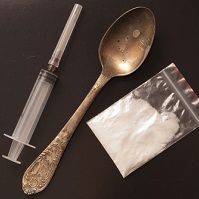Ithaca, NY Proposes Public Venues for Injecting Heroin Safely
Faced with a heroin epidemic that has addicts dying in public places one city considers European-style "safe injection facilities."

Should US cities open facilities where heroin users could inject drugs under medical supervision? In Ithaca, NY, the idea has strong supporters, including the city's mayor.
Backers of such programs point to the growing national problem of heroin addiction that is taking a toll not just on addicts but the quality of public life.
Some cities are closing public restrooms to keep out addicts and suburban 911 crews now carry naloxone. Still, the problems of users injecting in public, and of an increase in overdosing, have not gone away. Drug paraphernalia litter is more common, as are online cellphone videos showing people shooting up in unlikely public places (buses, hospital visiting rooms) in full view. Reports of fast food workers finding heroin-overdosed bodies in their restaurant bathrooms are frequent.
What’s a city supposed to do?
In the Netherlands, Australia, and more recently Canada, the answer has been to open places where addicts can inject their drugs with medical supervision.
That idea is now under consideration in of Ithaca, NY.
The city’s mayor Svante Myrick is backing a proposal to open such a “safe injection facility” a government-owned site to be staffed 24/7 by a nurse or other medical professional.
“Basically it’s a room with a nurse and people bring their own heroin,” Myrick says. Having addicts get their fix while observed by a nurse would also allow that nurse to immediately offer the addict help with getting off the drug “something that doesn’t happen in shooting galleries,” Myrick adds.
A Canadian television station filmed such a center and interviewed staff and clients. In the video a nurse displays bins full of clean needles, small metal dishes for heating heroin, sterile water to mix it with, and other items designed to cut the risk of drug injecting spreading disease.
Myrick agrees the program he proposes is controversial, and says that drug laws would have to be relaxed to permit the centers to operate.
“Arresting people hasn’t worked,” Myrick said, "It's time to try something new."
Some critics say the money—by one Canadian estimate $3 million per center per year—spent on running the centers would be better allocated to drug treatment.
In 2007 a Rutgers University criminal justice expert writing on GlobalDrugPolicy.org criticized the concept, saying the research supporting the idea that safe injection sites would curb the spread of disease was of poor quality and that those who favor it were not basing their proposals on proven facts.
The Ithaca report outlining the proposal and the reasoning behind it is here.